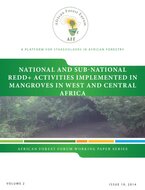With the decision on the Reduction of Emissions from Deforestation and forest Degradation (REDD+) in COP-16 in Cancun, the contribution of forests to climate change has been recognized as a cornerstone of the post-2012 climate change agenda. REDD+ includes policy approaches and positive incentives on issues relating to reducing emissions from deforestation and forest degradation in developing countries, and recognizes the contribution of conservation, sustainable management of forests and enhancement of forest carbon stocks in achieving REDD+ objectives. The mangroves, with their unique characteristics hold some potential for realizing the aims of REDD+.
This study involved literature work on the extent and prevalence of the mangroves in West and Central Africa, to be able to determine their present status, ownerships, local uses and national policies governing them. This served as the basis for the assessment and analysis of implementation of REDD+ in the sub-regions. Online sources and interviews of key informants were employed for data gathering on people’s perceptions of the mangrove forests, the uses to which they are put, their contributions to livelihoods and anthropogenic factors affecting their sustainable management. Data and information germane to REDD+ in the countries, where mangrove forests exist, were sourced on such issues as Policy, Methodologies, Finance and Adaptation to, and Mitigation of climate Change impacts. Extant national forest policies in relation to ownership, use and conservation of the mangroves were analyzed to know how they impact climate change, and in particular, REDD+ schemes, with a view to up-scaling proven best options.

